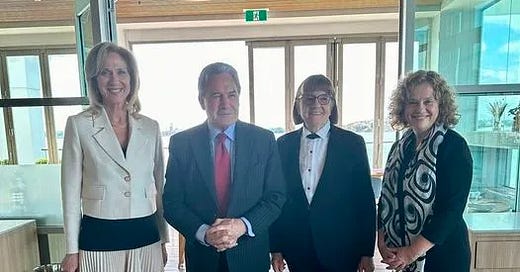Zdravka Bušić and the long shadow of the Ustaše
The visit to Aotearoa by a Croatian MP with links to extremist nationalist groups has gone unremarked on, despite her meeting with the deputy Prime Minister
This past September New Zealand’s deputy Prime Minister met with Zdravka Bušić, a member of the Croatian Parliament and Chair of the Parliamentary Committee for Croatians Abroad. She was in New Zealand for the Australia and New Zealand Croatian Women in Leadership Conference, where NZ First MP Tanya Unkovich also spoke. On Facebook, Unkovich posted “Today it was a privilege to accompany Deputy Prime Minister and Foreign Minister Winston Peters as we welcomed Croatian MP Zdravka Bušić and H.E Betty Pavelich, Croatian Ambassador to Australia and New Zealand.”
Bušić first became an MP in newly independent Croatia following the breakup of Yugoslavia. She represents the centre-right Croatian Democratic Union (HDZ).
Her background, however, is more extreme. In the 1970s Bušić became involved with the Croatian National Resistance (HNO), also known as Otpor. Otpor was founded by General Vjekoslav Maks Luburić, a military commander known as the warden of the Jasenovac extermination camp during World War II. Croatian historian Ivo Goldstein estimates that 90,000 to 100,000 people died at Jasenovac, the largest concentration camp complex not operated by the Nazi regime.
After the defeat of the fascist Ustaše by the Yugoslav Partisans led by Josip Tito, who would become prime minister and later president of post-war Yugoslavia, many sympathisers of the regime fled into the diaspora communities of Western Europe, North America and Australia. In Yugoslavia during the 1960s and 70s, Croatia (along with Bosnia and Herzegovina) underwent unprecedented economic transformations that resulted in citizens, especially in urban areas, enjoying standards of living comparable to much of Western Europe. It was in the diaspora where Croatia came to be seen as a nation oppressed by Yugoslav socialism. In his 2003 book Homeland Calling: Exile Patriotism and the Balkan Wars, Paul Hockenos writes:
“Only among the diaspora rightists, obsessed with historical conflicts and isolated from the reality of contemporary Yugoslavia, could such symbolic matters serve to justify armed rebellion. Whatever the radical Croat ex-emigres may claim, theirs was never a popular movement enjoying even moderate support either in Croatia or among the diaspora. Although in hindsight the former emigres contrive to give their struggle a democratic veneer, it was, in fact, deeply undemocratic, nationally exclusive, and profoundly authoritarian.”
Keep reading with a 7-day free trial
Subscribe to Feijoa Dispatch to keep reading this post and get 7 days of free access to the full post archives.




